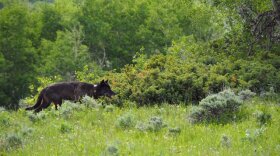The U.S. Fish and Wildlife Service removed protections Thursday for the gray wolf under the Endangered Species Act in the lower 48 states.
The move doesn’t affect Wyoming, Montana or Idaho, as wolves in those states were delisted a few years ago. But it could affect states in the Mountain West where wolf numbers haven’t rebounded, like Colorado, which has wolf reintroduction on its ballot this year.
Interior Secretary David Bernhardt said in a that the wolf "has exceeded all conservation goals for recovery" for the Northern Rocky Mountains and Western Great Lakes populations. The latter includes Michigan, Minnesota and Wisconsin. The decision excludes a population of Mexican gray wolves in New Mexico and Arizona.
Multiple environmental groups don’t agree that wolves have sufficiently rebounded in the U.S., though, and fear they’re losing federal protection before they can make a full comeback in states both in and around the Mountain West.
“Federal and state agencies are more concerned with meeting a minimum target. So, rather than aiming to recover a species across its historic range, they’ve really been aiming for a minimum,” said Andrea Zaccardi, a senior attorney with the Center for Biological Diversity.
Environmental groups see that as a problem because of wolves’ role in larger ecosystems. And in states like Washington, Oregon and California, the wolf populations are still small. So the Center for Biological Diversity intends to sue.
“We will definitely be going to court,” Zaccardi said.
The Rocky Mountain Elk Foundation supported the move to delist, though, and said there’s just some places they don’t think wolves should be anymore because of human activity. He pointed to elk populations, which he said probably won’t reach levels they had before European settlement, either.
“Just because a species covered a certain landscape does not mean it works for them again,” said Mark Holyoak, the group's communications director.
That foundation also sees this as an issue that should be handled at a more local level.
“Just like if you have elk that need to be managed or deer that need to be managed, we believe that wolves need to be managed and done so by state wildlife organizations,” Holyoak said.
The Center for Western Priorities says most citizens’ voices weren’t reflected in this decision, though.
It did an of 1,000 public comments on the proposed delisting of the wolf, randomly selected from a pool of more than 100,000 posted online. From that group, it found less than 2% were in favor of taking away wolves’ protections.
“Despite that overwhelming, nearly unanimous support for protecting the wolf, the Trump Administration went ahead anyway and is removing those protections,” said Aaron Weiss, the group's deputy director.
The U.S. Fish and Wildlife Service contends that states should be the ones to decide how to manage wolves, and that the animal’s recovery is sufficient to delist, even if that recovery isn’t in every state.
This story was produced by the Mountain West News Bureau, a collaboration between Wyoming Public Media, Boise State Public Radio in Idaho, KUNR in Nevada, the O'Connor Center for the Rocky Mountain West in Montana, ������٠in Colorado, KUNM in New Mexico, with support from affiliate stations across the region. Funding for the Mountain West News Bureau is provided in part by the .
Copyright 2020 Boise State Public Radio News. To see more, visit . 9(MDAxNDQ2NDAxMDEyNzU2NzM2ODA3ZGI1ZA001))







